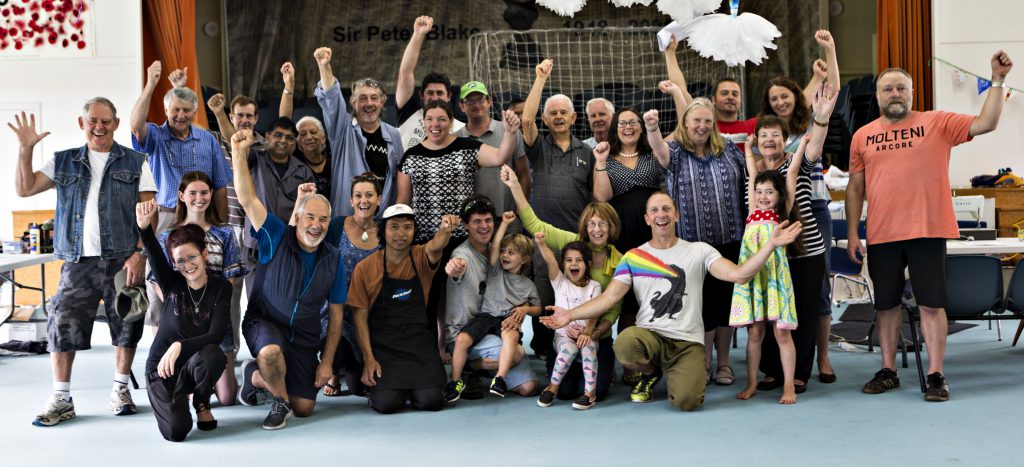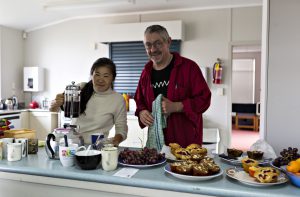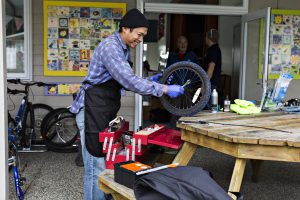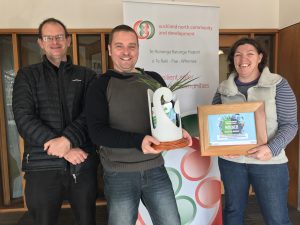




Connecting communities one repair at a time
Repair Cafés are happening all over Aotearoa. These pop-up events combine recycling, repair, community connection and food. It’s a win-win!
Nowadays the need for a circular economy is a statement that’s hot on everyone’s lips. A perfect example of an initiative that meets this need is the Repair Café movement. Repair Cafés seem to be popping up everywhere! In fact, there are over 1,500 Repair Cafés worldwide. The first one was in The Netherlands in 2009 and now they are happening in Aotearoa too: in Christchurch, Kapiti Coast, Te Puke, Auckland…
So what is a Repair Café? It’s a pop-up event where people can bring items to be repaired instead of throwing them away. The event is run by volunteers who have repair skills to teach or to share. Depending on the expertise of the volunteers, repairs can be made to machinery, bikes, clothing, toys, furniture, electrical appliances and more. The purpose of these events is two-fold: to try to change our “throwaway culture” and to bring people in the community together. An added bonus is that it saves people money: if their item can be repaired they don’t need to replace it or pay for more expensive repairs elsewhere. If the item can’t be repaired, then the event organisers dispose of the item. It’s a win-win!
Work with diverse people and sectors
Steve McLuckie is the coordinator for Shore to Thrive, a strengths-based, community-led partnership project between Auckland North Community and Development (ANCAD) and the Takapuna Methodist Church. Steve explains that Shore to Thrive “is all about bringing people together, fermenting locally led change and positive outcomes in partnership with local people. It is about supporting community connections and strengthening relationships to enhance the wellbeing of families and children in North Shore Communities”.
Shore to Thrive partnered with Global Action Plan Oceania and the Devonport Community Recycling Centre team to organise their first Repair Café event in 2016 in Bayswater. Steve says that they thought this local opportunity would fit their strengths-based and community-led kaupapa. They had heard about similar events being held overseas and the first one in Aotearoa had taken place in Pt Chevalier (Auckland) earlier that year. Steve explains that they decided to run a Repair Café because they bring people together to share skills, save money and reduce the amount of waste going to landfill. And, of course, there’s always food! “It’s a beautiful idea that ticks a whole lot of different boxes”.
This first event provided the catalyst for a successful, collaborative application to Auckland Council’s Waste Minimisation and Innovation Fund that has allowed the partnership to grow the Repair Café movement across Auckland. In 18 months, they supported 18 events and saved people around $60,000 on replacement costs!
Build from strengths
The key to the success of a Repair Café event is finding skilled and passionate volunteers. The volunteers not only need to have repair skills, but they need to buy-in to the idea and be able to engage with the community. The team managed to recruit local volunteer experts in a variety of areas: electrical appliance repair, clothes repair, woodwork, bike repair and more. All of them were engaged and excited to be participating. Often these events can see people come out of the woodwork and use skills that had been lying dormant. Volunteers can not only help the community by using their skills, they can also teach these skills to others.
Learn by doing
Glenys Chapman, who started volunteering at some of the events by doing mending, says she participates because she enjoys “being able to recycle things, talk to people, the community feel, the shared food: the whole idea gels with me”. Mostly she repairs, rather than teaching repair, but “sometimes people learn how to sew on a button, for example. I try to talk about what I’m doing so that the person might learn the skill themselves, but not everyone has a sewing machine”.
Tasha Wehrle, who attended an event and then decided to volunteer at Repair Cafés, says “for the people who attend the benefits are huge, as it saves people time, money and having to drive out of the area to get something fixed. It brings people together, they connect and it strengthens knowledge, friendship and community spirit. The same benefits apply for volunteers but with the added bonus of feeling useful and using their skills”.
What’s next?
Soon after we did this interview, the Repair Auckland partnership won an Auckland Community Zero Waste Award in the following category POWER OF THE PEOPLE – For a group, community organisation (not for profit) or school that has demonstrated commitment, effort and leadership. There are already nine Repair Café events scheduled for 2019, with the prospect of many more. These include the first of the year at Browns Bay on the 17th of February.
If you’d like to learn more about how to run an event in your area, check out the Repair Café Auckland website, where you can find an event “how to” guide. They can also support you to plan and host a local Repair Café at your community facility or attend one at another site. And if you’re in the Auckland area, you can hire a trailer full of tools for your event!
Here’s a look at the 2017 Bayswater event in an excerpt from the film Living the Change.
And here’s another Repair Café event at the Gribblehurst Hub in Auckland.




